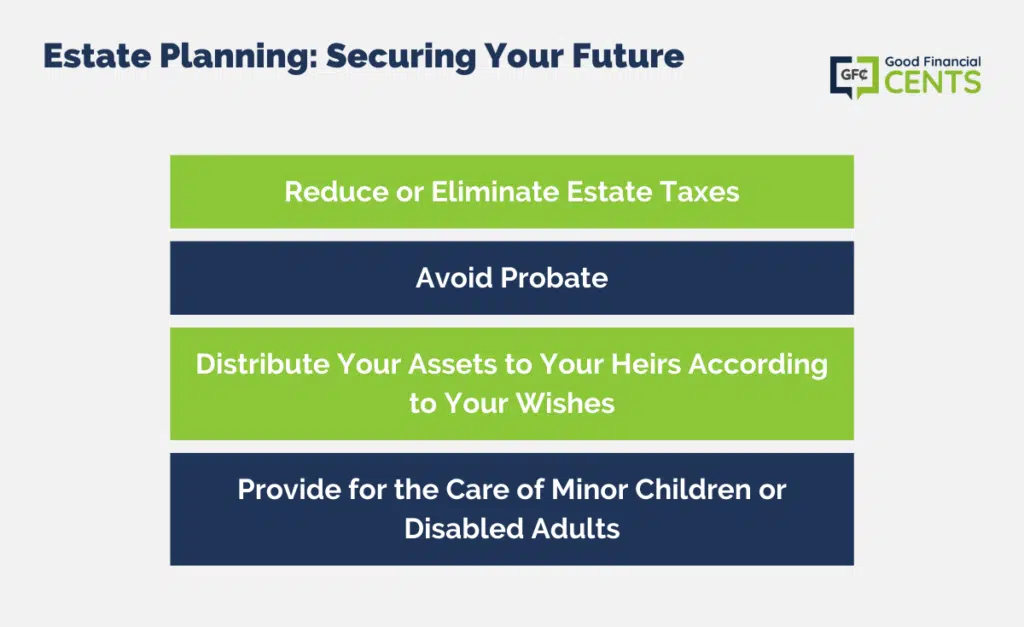This is the second part of a two-part series on estate planning by JoeTaxpayer. Be sure to check out the first post What is Estate Planning.
Earlier, we talked about designated beneficiaries. It’s important to note that the accounts that use designated beneficiaries to avoid probate are not subject to public disclosure.
Table of Contents
A trust is a fiduciary arrangement that allows a third party, or trustee, to hold and manage assets on behalf of a beneficiary or beneficiaries. Trusts are established by a trustor (also known as a settlor or grantor), who transfers the title of certain assets to the trust.
This leads us to the next topic, trusts. Trusts also are not part of the probate process, but there are different types of trusts each with their additional benefits.
Special Needs Trust (Also Called a Supplemental Needs Trust)
This trust lets you set aside assets for a beneficiary who has a disability and would otherwise be disqualified from receiving government assistance if they inherited these funds outright. The trust must be set up as an irrevocable trust funded while you are still alive.
A spendthrift trust is similar to the special needs, except it can be either revocable or irrevocable. Its main purpose is to protect the beneficiary from his reckless spending. You can work with the attorney setting it up to specify the exact withdrawals that will be allowed, as a percent, fixed dollar amount, or some combination of the two.
You can further specify the circumstances permitting additional withdrawals if any. I recommend using any rules beyond a distribution amount sparingly. A beneficiary can request that a trust be broken if the conditions go against the public good. You want to protect your heirs, not rule their lives from the grave.
Estate Tax Exemption Increased
The estate tax exemption amount for 2023 is $12.92 million for an individual or $25.84 million for a married couple. This means that an estate valued at $2 million would not be subject to any estate tax, regardless of whether the spouse is still alive.
Even though the estate tax exemption amount is high, it is still important to do some estate planning. This is especially true if you have a large estate or if you have complex family circumstances.
Estate Planning Can Help You To:
- Reduce or Eliminate Estate Taxes
- Avoid Probate
- Distribute Your Assets to Your Heirs According to Your Wishes
- Provide for the Care of Minor Children or Disabled Adults
There are a variety of estate planning tools available, such as trusts, wills, and life insurance. An experienced estate planning attorney can help you to choose the right tools for your needs.

Bypass Trust
This is a way of preserving that first exemption, while still providing income for the surviving spouse during her lifetime.
The mechanics of the trust are simple. Trusts are set up to receive the exemption amount upon the passing of the first spouse. (Note – the trust can be written to specify the receipt of the exemption amount in effect at the time of passing.
Otherwise, one would have an annual visit with a lawyer, which could get expensive.) That trust then offers the surviving spouse the right to withdraw 5% or $5,000 whichever is greater, each year.
Addition amounts are permitted under specific situations such as medical bills, but the withdrawal right is not unlimited. When the surviving spouse passes, the trust can be disbursed in full to the next beneficiary, with no tax due regardless of growth within the account.
There is no step-up in basis, as that occurred when the trust first received the assets, so a cost basis is established and capital gains may be due upon sale of the assets. In the end, the cost of creating these trusts is nothing compared to the potential estate taxes this process helps avoid.
Irrevocable Life Insurance Trust
The last type of trust (yes, there are even more) I’ll discuss is an ILIT, an Irrevocable Life Insurance Trust. There’s a misconception out there that life insurance proceeds aren’t taxable.
As a spouse can inherit unlimited amounts from the deceased’s estate, this may be true in many situations, but not all. If a couple passes at the same time, their heirs will find that the proceeds of insurance policies are part of their estate. Or, even if they pass at different times, the proceeds of both policies are then part of the second spouse’s estate.
Given how inexpensive insurance can be, this is not such an unusual event. Enter the ILIT. Instead of direct ownership of your insurance policies, the ILIT is set up for the insurance of each spouse. It, and not you, is the owner of the policy, thus, when you pass, it is not part of your estate. It’s also typical to set up the ILIT with similar provisions as the bypass trust, to provide first for the surviving spouse, and then the next beneficiaries upon passing.
Gift Tax Exclusions
This is a good place to add some discussion of the annual gift exclusion. If you are in a position where you are comfortable giving away assets while you are still alive, keep in mind the current exclusion is $17,000 per year per recipient.
If any of those grandkids are in college, you’re welcome to pay their tuition bills in any amount, with no tax due. As with any of the numbers I’ve presented, this number is subject to change over the years.
The Bottom Line
Before I close this discussion, I’d like to talk for a moment about the use of life insurance as part of one’s estate planning.
There are several circumstances where an insurance policy can provide needed cash for an otherwise illiquid estate situation. It’s not unusual to find that towards the end of one’s life, their house is paid for and comprises the bulk of their assets.
Tough to split a million-dollar home and a few hundred thousand dollars in cash and stock among two or more beneficiaries. The same issue of indivisibility can occur when leaving the business to one child, but still wanting to treat the other(s) fairly. In both situations, a well-planned insurance policy can help avoid a forced sale of a house or business.
Keep in mind, that the numbers change, as will your situation, over time. This article is my attempt to bring to light some of the details of estate planning that can help you better preserve the assets you’ve worked so hard to accumulate over your lifetime. If you decide to pursue the implementation of a trust, seek the advice of a knowledgeable trust attorney.
This is not something to bring to someone with general practice; it’s not a simple matter to keep up with the latest laws in this area.







